The red carpet isn’t actually red, and other secrets underfoot at the Oscars
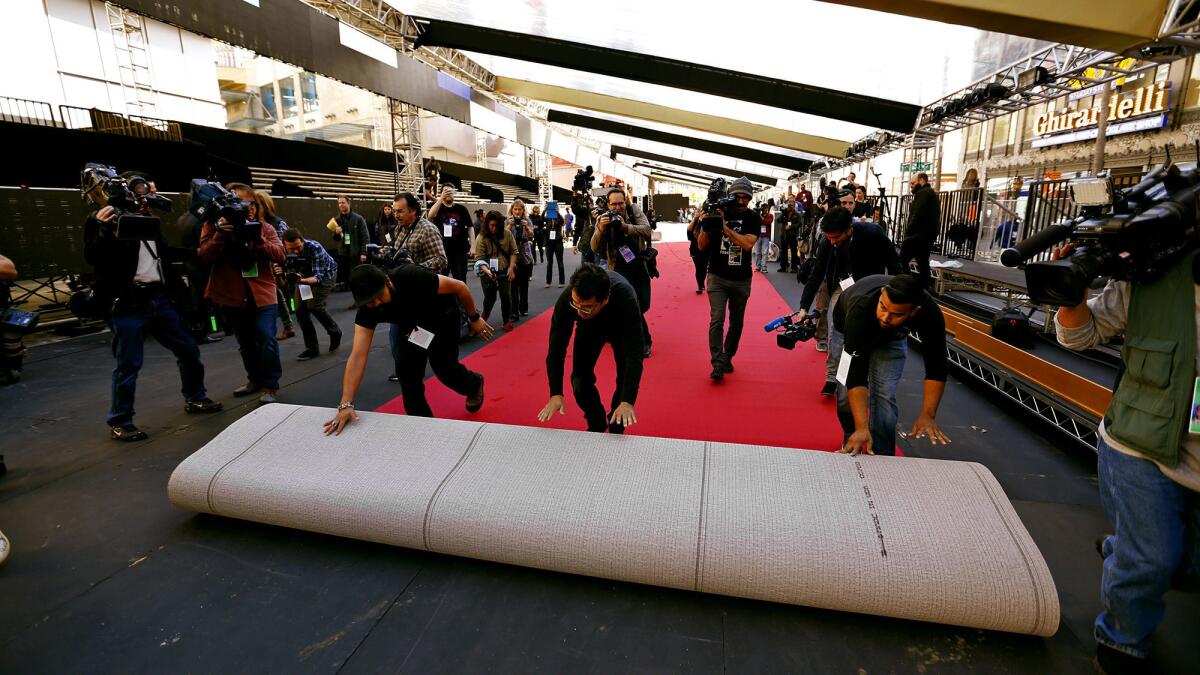

In Aeschylus’ play “Agamemnon,” the titular king’s homecoming from the Trojan War is marked by his vengeful wife Clytemnestra, who offers him a red carpet on which to walk.
“Now my beloved, step down from your chariot, and let not your foot, my lord, touch the Earth,” she says.
But Agamemnon is dubious, noting that only gods are permitted to walk on such a "crimson pathway.” (The king was right to be concerned: his wife soon murders him in a bathtub.)
The Greek tragedy was written in 458 BC and marks the first historical reference to a red carpet. Roughly 2,500 years later, gods of a different sort — Hollywood idols — seem to have little issue with treading on the carpets.
And there is perhaps no more famous a red carpet in show business — and the world — than the one unfurled in front of the Dolby Theatre in Hollywood for the Academy Awards.
Signature Systems Group, a flooring company with offices in Santa Fe Springs, is responsible for making sure that the 50,000-square-foot carpet not only shines, but also doesn’t trip up any starlets during Sunday’s awards show. The company has handled the painstaking task of installing the Oscars carpet since 2008, when it acquired American Turf & Carpet, a local outfit and longtime show vendor.
The Texas company is a key cog among dozens of businesses (think: florists, chauffeurs and caterers) who work behind the scenes in Los Angeles County's multimillion-dollar Oscar economy.
“We are dealing with a lot of different events, but there is none other like this one,” said Moises Arteaga, national distribution manager of Signature Systems.
The unique nature of the Academy Awards extends to its carpet: It isn’t even a traditional red.
Instead, the carpet is closer to burgundy and has been for the last 15 years. The exclusive shade — called Academy Red — is supposed to flatter the A-list actors who are photographed and filmed walking on it. It’s a secret color, one whose precise specifications the show’s organizers won’t reveal for fear of copycats.
“Listen, there is only one Academy Awards,” said
The secrecy surrounding the carpet illustrates the exacting nature of the Academy of Motion Picture Arts and Sciences, the organization behind the annual awards show. And it’s just one quirk of the custom carpet.
A crew of about 18 workers began installing the red carpet along Hollywood Boulevard in front of the Dolby on Feb. 21. It will take them nearly 900 man-hours to install the carpet, and the work won’t be finished until just before the stars begin arriving Sunday afternoon — as throngs of foreign tourists, street performers in superhero costumes and edgy security guards look on.
“There are road closures, there is heavy security … there is definitely a buzz in the air,” said Lynn Nichols, West Coast regional sales manager for Signature Systems. “We just block everything out — just do our job.”
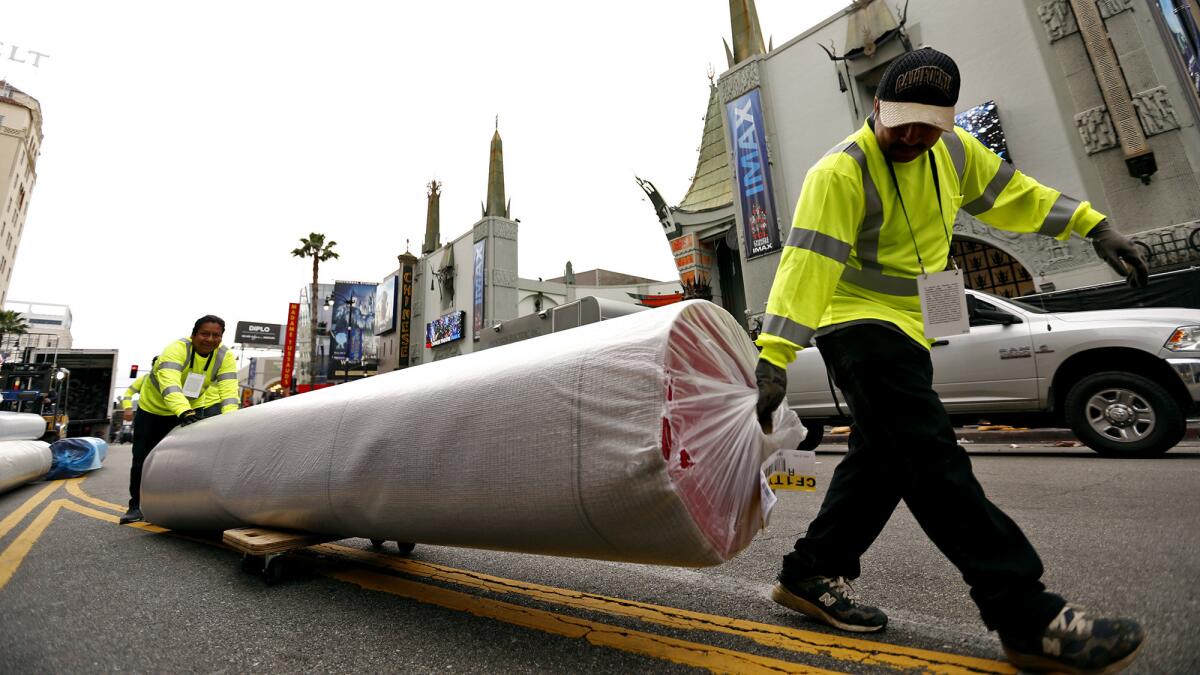
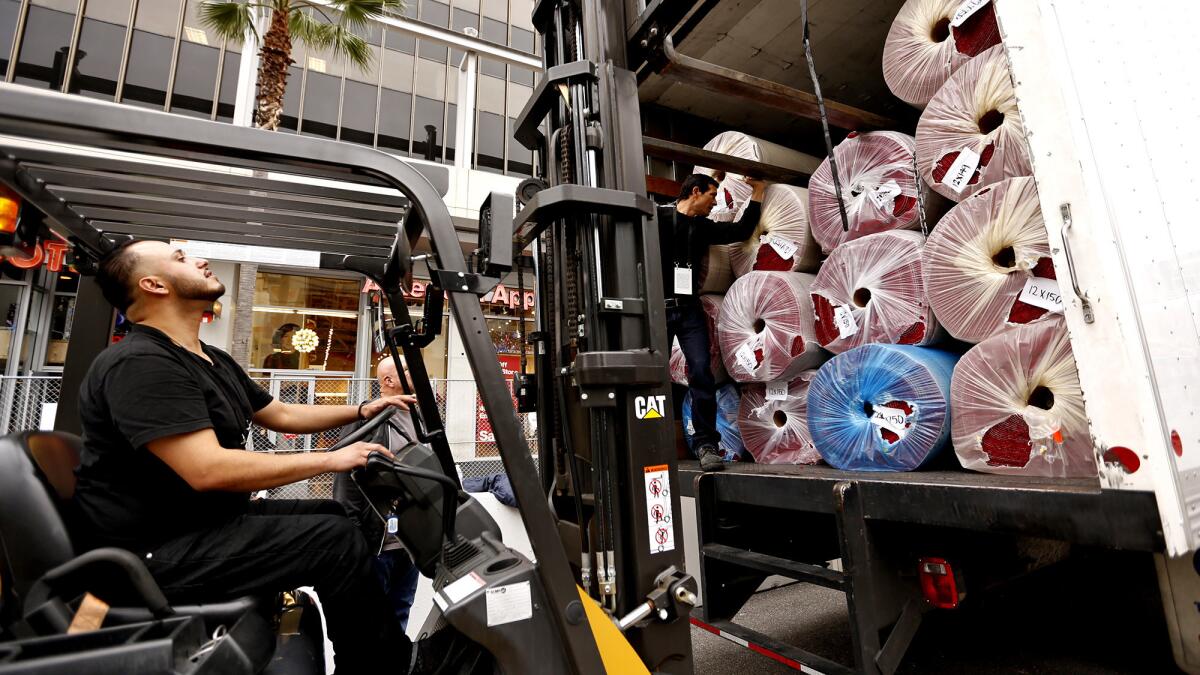
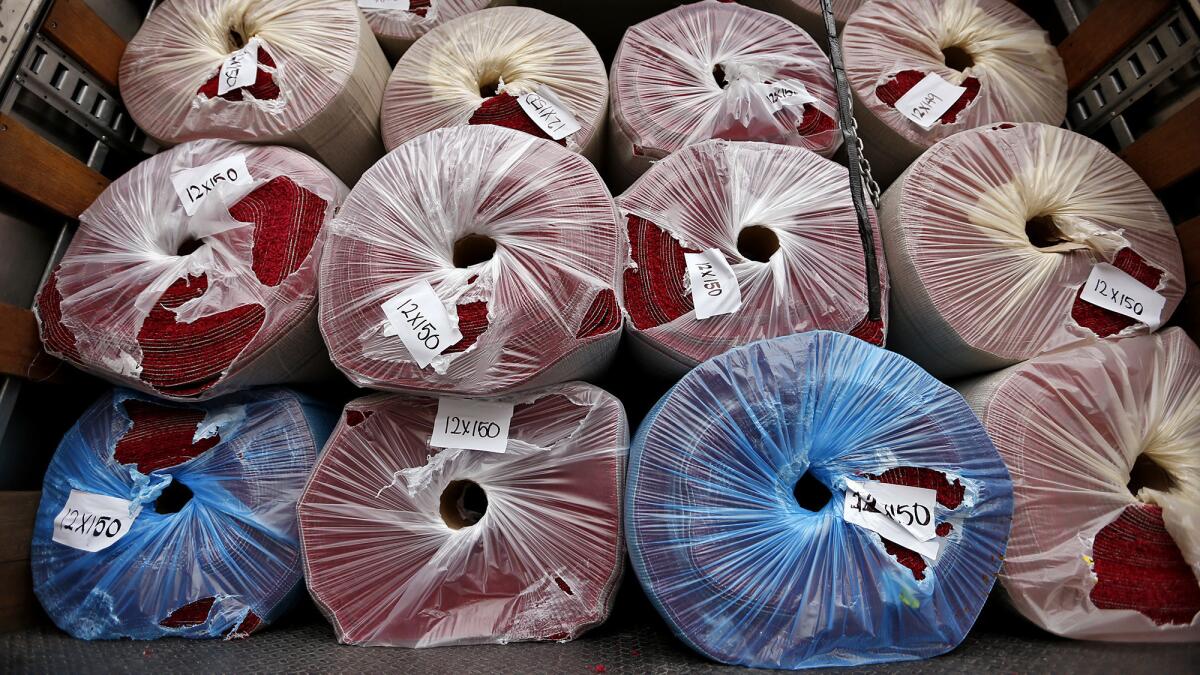
Signature Systems won’t say how much it’s making on the Academy Awards job or discuss its finances, but executives say business is growing and that the company sold more than 15 million square feet of carpet and turf in 2016.
The Oscars job isn’t the company’s biggest — a recent Super Bowl assignment called for about 650,000 square feet of carpet. Signature Systems has also worked on the Golden Globe Awards and the Grammy Awards, but the Oscars are special.
“This is a highlight for us,” Nichols said.
Hollywood can trace its red carpet history back to theater impresario Sid Grauman. He first deployed one for the 1922 premiere of “Robin Hood,” starring Douglas Fairbanks, at the Egyptian Theatre in Hollywood.
The reasons for the carpets’ use are manifold, said Hollywood historian Marc Wanamaker.
“The first purpose is that it would be an obvious guideline of where people would walk,” he said. “The other reason is that they didn’t want anyone slipping or falling going into the theater. The third reason is that it is glamorous.”
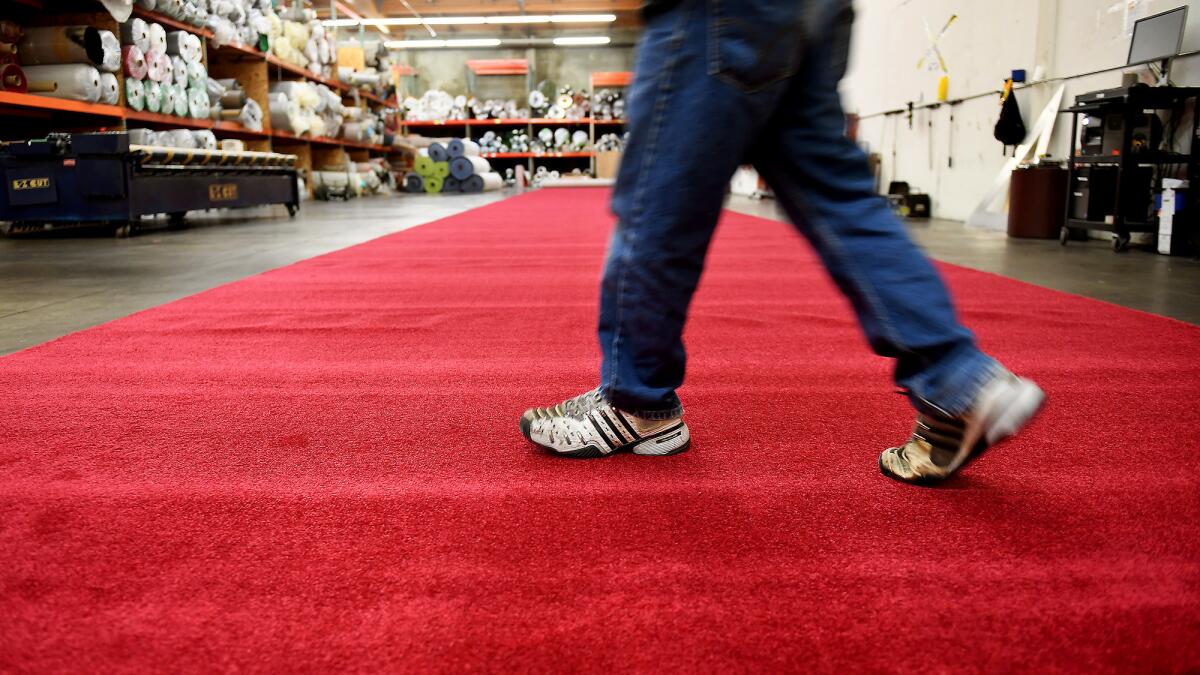
A red carpet made its debut at the Oscars in 1961 and has since become an integral part of the spectacle, whose pre-show extravaganza is widely viewed by fans tuning in to check out stars’ fashion hits and misses.
Red carpets, of course, were used long before Grauman popularized them and the Oscars made them a cultural focal point. Over the last several centuries, they’ve become popular extravagances for monarchs, religious leaders and other dignitaries. Apparently, Agamemnon’s gruesome fate — foreshadowed by his wife’s red carpet — has scared no one away.
Even if the race for Oscar gold can seem like it verges on bloodsport — or a Greek tragedy, depending on your perspective — the Academy Awards’ red carpet has far more benign origins.
It is fabricated from nylon at a mill in Dalton, Ga., known as the “Carpet Capital of the World.” (The name of the mill, like the color specifications, is a secret.)
Earlier this month, Signature Systems took delivery of the carpet at its Santa Fe Springs offices. On Feb. 13, workers in the facility’s cavernous warehouse unrolled a 12-foot-by-150-foot portion of the carpet, straining as they kicked and pushed the 630-pound roll down a wide walkway.
A warehouse worker dropped to his knees and began trimming the edge with a carpet knife. He and four others spent several days making precision cuts, using paper templates placed on top of the carpet to guide their incisions. This prepared the carpet for the zigs and zags it must make as it inches down Hollywood Boulevard and up into the forecourt of the Dolby at the Hollywood & Highland complex.
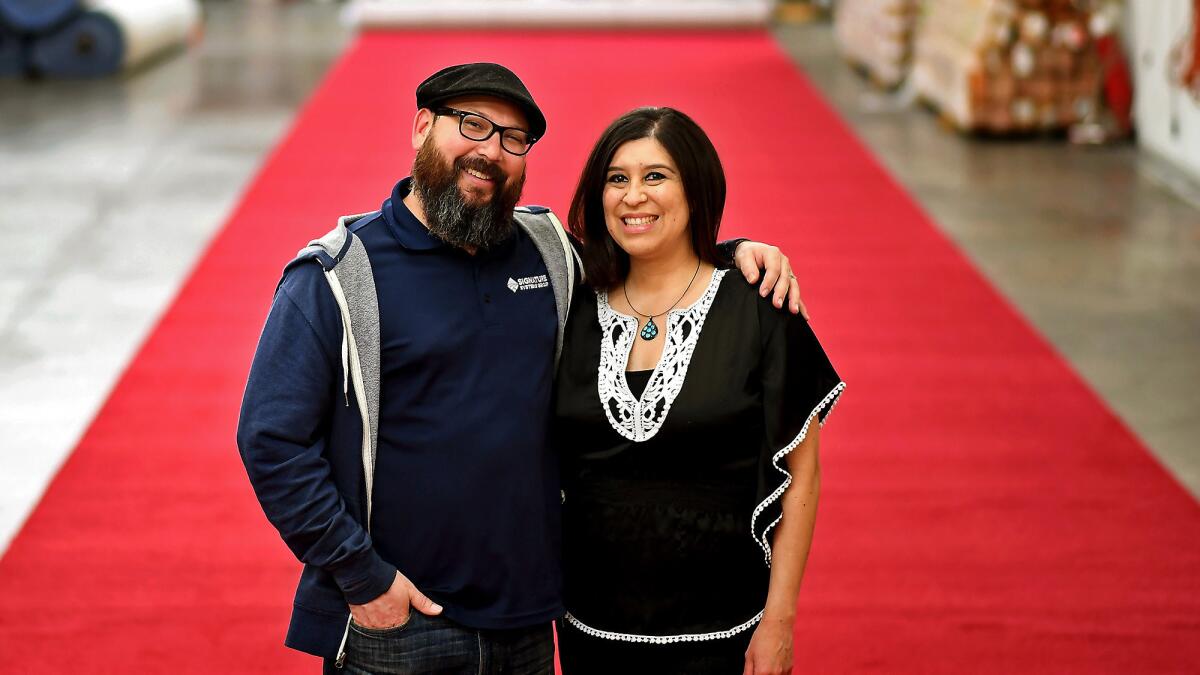
Eyeing the unrolled swath, warehouse associate Angel Luis said he was “a little nervous” — it was his first time working on the Academy Awards’ red carpet. He doesn’t typically watch the Oscars, but this year, he plans to tune in.
“This type of stuff just takes so much time,” Arteaga said. “We try to get a head start on this type of work that is intricate and detailed.”
The carpet was trucked to Hollywood on Tuesday afternoon as an off-and-on rainstorm pelted L.A. Upon arrival, a worker with tattooed knuckles used a forklift to pull roughly 30 carpet rolls from the truck, which was parked in a closed section of Hollywood Boulevard in front of Grauman's Chinese Theatre. As he worked under a sky thick with the threat of rain, a few tourists watched the spectacle from behind a chain-link fence.
“That’s the official red carpet from the swap meet!” joked a man working for another vendor.
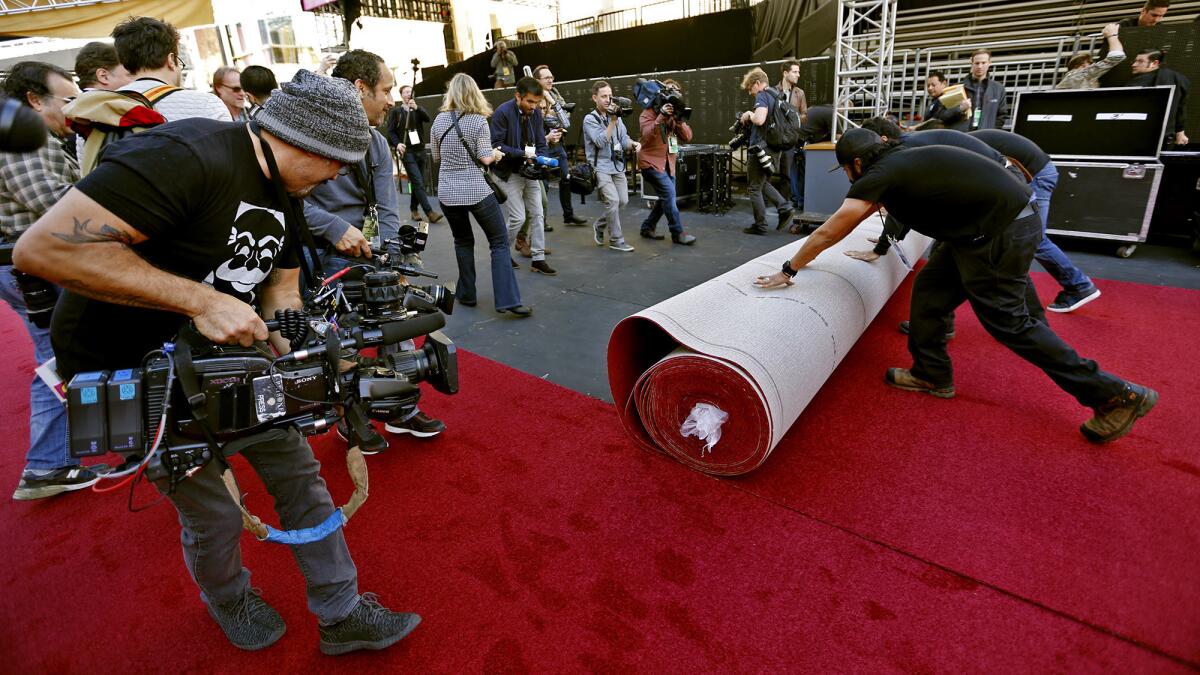
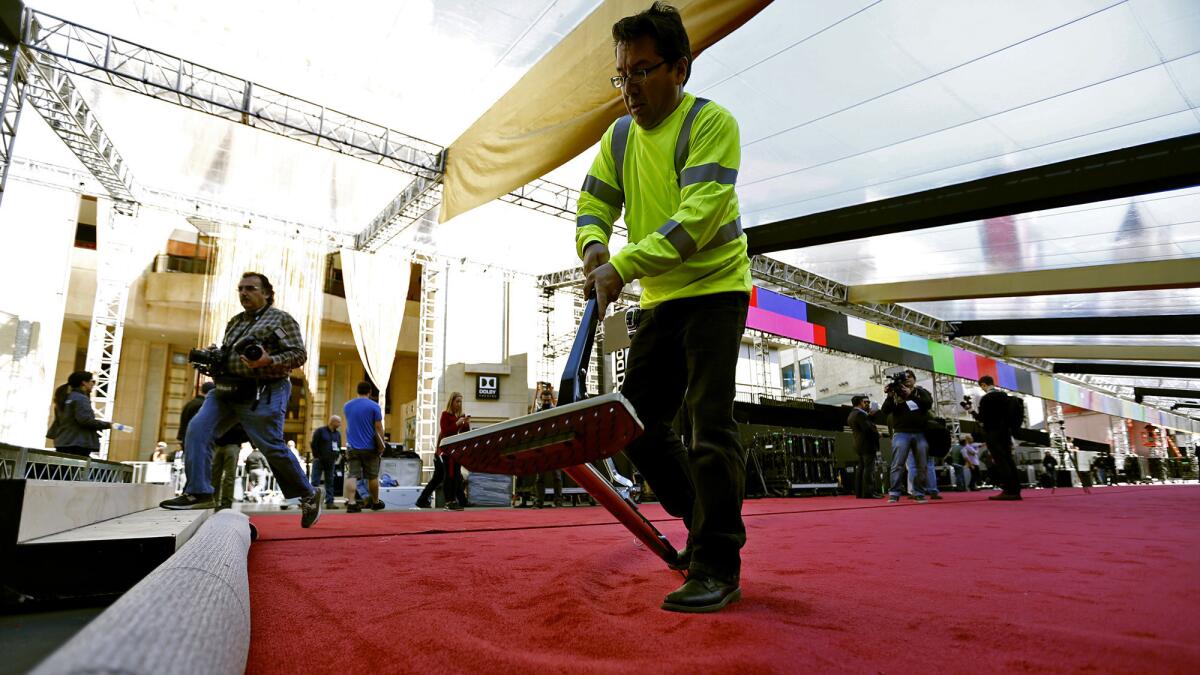
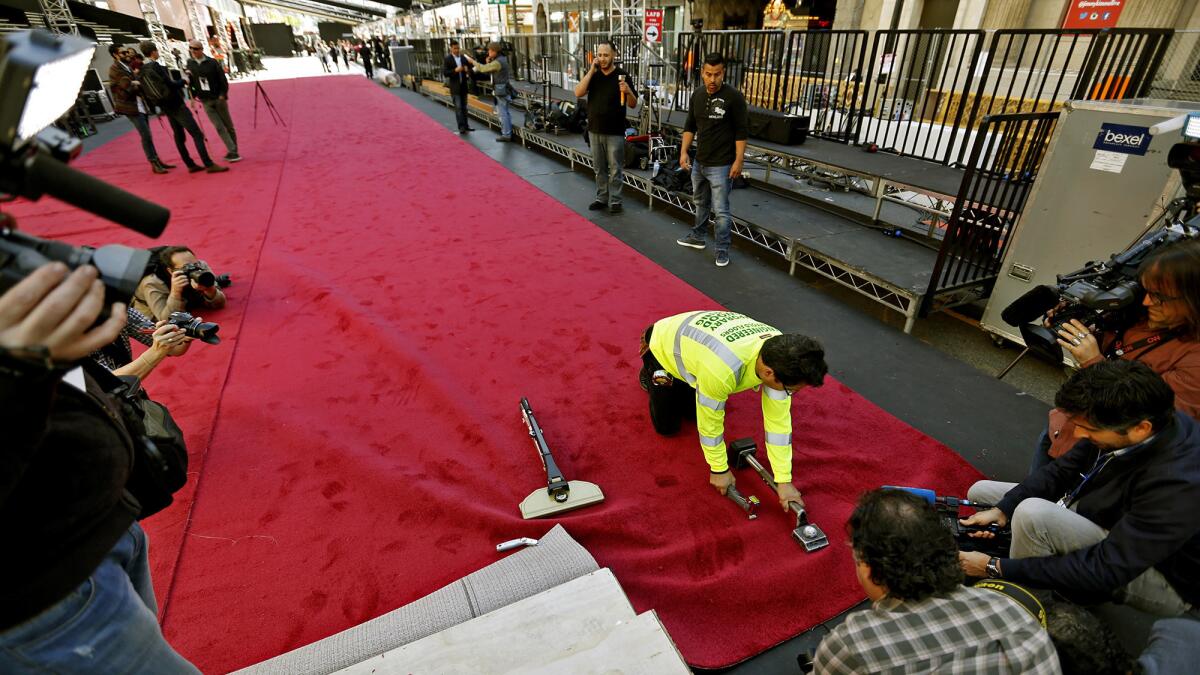
Four workers loaded the rolls onto a wooden dolly and pushed them down Hollywood Boulevard toward the Dolby. An installer hopped onto one of the rolls and straddled it like a cowboy atop a wild stallion.
They lugged a roll inside the Dolby’s busy forecourt, which is lined with shops including a Louis Vuitton outpost. As workers unrolled the carpet and affixed it to the floor with double-sided tape, shoppers stopped to gawk. A uniformed security guard eyed tourists and shouted “keep off the carpet.”
Lewis, who is contracted by the academy to arrange the pre-show portion of the Oscars, said that security is in place to deter people from snatching a swatch of the carpet, which could be used to fabricate a copy or even be sold as a collector’s item.
“I know that people have taken hunks out of the carpet in the past,” Lewis said. “You could put it on EBay.”
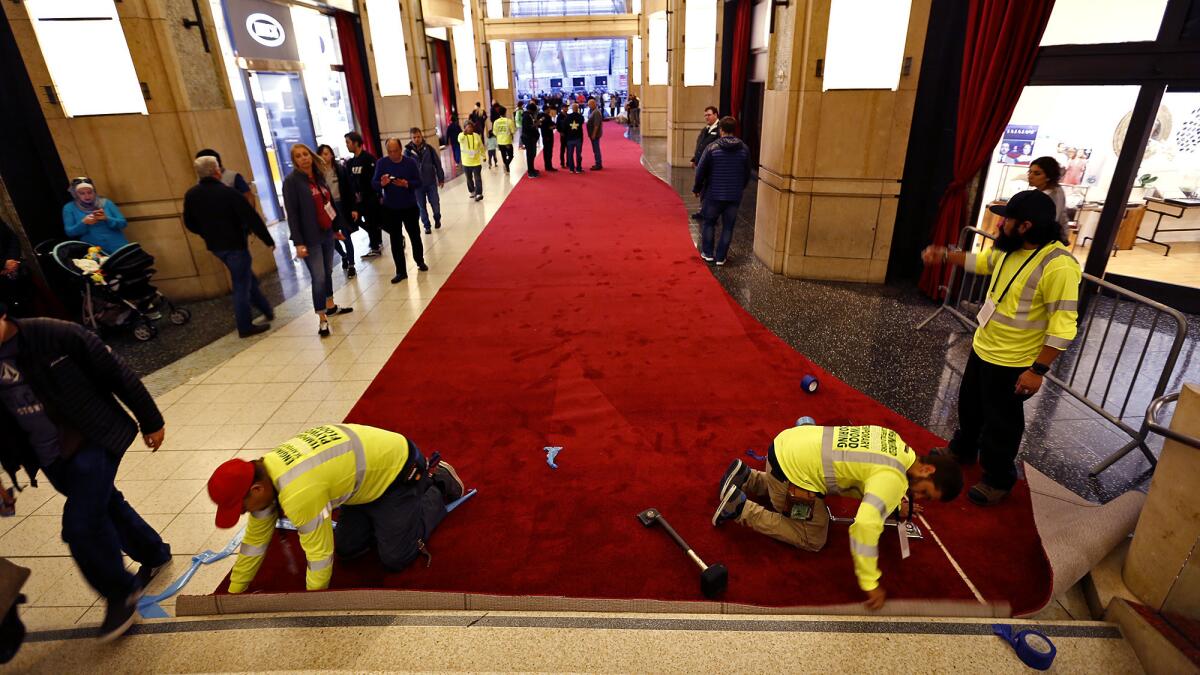
But of greater concern than thieves is the weather. Rain, of course, is the scourge of Oscars red carpet professionals. In 2014, Jennifer Lawrence took an apparently rain-assisted spill on the show’s carpet.
To make certain that everything goes smoothly Sunday, Signature Systems employees will be on hand to ensure any weather-related issue is resolved quickly. A tuxedoed installer will be prepared to vacuum the carpet as needed. (The carpet is only used once and destroyed, in an undisclosed manner, after the show.)
Perhaps surprisingly, none of the professionals responsible for the red carpet who were interviewed by The Times had heard of the tale of Agamemnon — an origins story of sorts for their line of work.
Still, that doesn’t mean they aren’t grateful.
“We can thank King Agamemnon for the volume of work he provides us,” Lewis said.
Inside the business of entertainment
The Wide Shot brings you news, analysis and insights on everything from streaming wars to production — and what it all means for the future.
You may occasionally receive promotional content from the Los Angeles Times.








